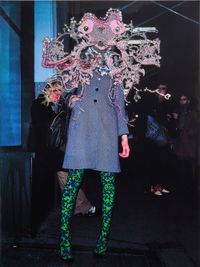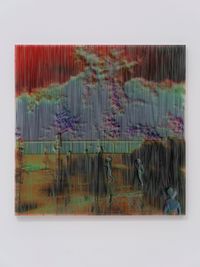

MAKI Gallery is pleased to present Mirror World, Japanese artist Asami Kiyokawa's first solo exhibition with the gallery, at Tennoz I, Tokyo. This presentation showcases the most recent developments in Kiyokawa's eclectic practice, encompassing a wide range of media from UV prints to embroidered photographs and books, an art form with which the artist has worked for a long time. The title of the exhibition refers to the virtual realm, which the artist interprets as an "alternate city" built using new technologies like metaverses and digital twins. By highlighting the intricate relationship between the real and virtual worlds, Mirror World delves deep into how our identities in the contemporary age have become increasingly multifarious and complex.
From early in her career, Kiyokawa used her distinctive embroidery techniques to create works that fascinated many with their vibrant color and vivid expression. She laid the foundations for her current practice in the decade after her first solo exhibition in 2001 by holding a number of solo shows and illustrating several highly successful picture books. In the 2010s, she continued to participate in numerous solo and group exhibitions and started receiving institutional interest. In 2019, she was awarded a solo exhibition at the ARARIO GALLERY SHANGHAI, a leading contemporary art venue in Asia, marking a major leap forward in her artistic career. At the same time, Kiyokawa has been actively involved in a wide range of creative realms, including costume design, film, and spatial design, and continues to be an unstoppable force in the 2020s.
Since the artist is most known for collaborating with celebrities and using snapshots of unique fashion, public attention tends to focus on the catchy and high-profile aspects of her work. However, what Kiyokawa has always pursued through her diverse artistic endeavors is the portrayal of the human identity and condition—her work intentionally utilizes the superficial to incisively capture the changing nature of the self over time.
As a former amateur model who studied fashion academically in the 2000s, Kiyokawa draws on her experience as an industry insider to highlight fashion in her work as a means of approaching an individual's inner nature. Fashion is something that expands one's psyche while simultaneously covering it up to protect it, serving as a disguise that deceives even the wearer themselves. In Kiyokawa's work, the human figure and the decorative elements that adorn its outward appearance are depicted as one and the same; they exist intimately intertwined, like a new skin formed by cells exuding from inside one's body. The artist's TOKYO MONSTER series, which was first presented in 2014, uses embroidered fashion snapshots from the 1990s to express people's inner desires, vanities, and conflicts. Kiyokawa believes that people adorned themselves more excessively during this period, and that fashion—a strong embodiment of material culture—played a significant role as a medium for expressing one's inner self. The artist's use of snapshots, a specific and tangible link to the zeitgeist of the era, grants the works a particularly persuasive power. For her solo exhibition TOKYO MONSTER, reloaded in 2021, Kiyokawa updated the TOKYO MONSTER series by using negative photographs taken after the 2020s with inverted brightness and color to express the unstable reality in which many of us live. The figures are partially blurred, their ambiguous outlines representing how the current social environment has influenced our perception of identity. Mirror World features the newest iteration of the series, titled TOKYO MONSTER (PARIS MONSTER / NEW YORK MONSTER / LONDON MONSTER). By incorporating snapshots taken in cities around the world, the artist captures the contemporary age from a global perspective.
The I : I series, which started in 2016 and is also featured in this exhibition, confronts the fact that the evolution of technology has allowed one's "surface," the outward manifestation of their inner self, to extend beyond physical objects like clothing into the digital realm. The works in this series use images posted to the artist's own Instagram page to capture the multilayered memories and emotions that lie behind the mundane scenes that are uploaded in rapid succession to social media platforms. Kiyokawa transfers the negatives and positives of each image onto the respective surfaces of thread and paper, combining them all in a layered manner. In the present age, where self-branding has become increasingly accessible through social media, digital media tools are, like fashion, an essential part of personal expression—an inseparable epidermis. However, while these works unite two sides of a single image, they do not seek to derive a single "truth." Rather, they celebrate the multilayered contemporary identity, born of a material- and information-heavy society and formed not in isolation but through connecting to things outside of oneself.
Kiyokawa continues to explore the topic of "the self in the digital realm," and in recent years has uncovered the "surfaces" that emerge alongside people in virtual spaces. In her 2020 solo exhibition, imma, Kiyokawa presented works depicting the virtual influencer "imma" and developed new approaches to shaping the identity of an individual who never existed in the real world. This attempt to create an inner life from a "surface" is similar to the way digital twins use advanced simulations to predict events that occur in real life, then feed them back to the virtual world. It reflects the incredible fact that reality can now be born out of the virtual. Just as one's essence can be influenced by the outward personalities they created through fashion and social media, the two sides of the individuals presented in Kiyokawa's work have the potential to be inverted at any time during their never-ending dialogue with each other. Mirror World, a work with the same title as the exhibition, depicts what the artist calls a "virtual city where death does not exist" and posits the idea of "freely reconfiguring our identities and contexts so we can be born anew as something completely different." Its blurred images eschew any clear boundary with reality and appear like a utopia behind a haze. Confronted with this dream of immortality, the greatest desire of humankind, the viewer is unable to ignore the work as a hypothetical and is drawn to face it head-on, consequently becoming more and more immersed in its spell. The fluid identity of the modern individual incorporates the "surface" created in the virtual world and undergoes an endless metamorphosis inwards and outwards, growing increasingly complicated as it dreams of an eternity that continues to exist beyond its physical form.
Asami Kiyokawa's works, which continuously explore the way people's identities change with the times, have always reflected our reality like a mirror. Mirror World, which represents the culmination of a diverse range of references from the past to the present, allows us to examine our past and present selves and even catch a glimpse of the future.
Press Release: Courtesy of MAKI
1-33-10 Higashi-Shinagawa
Shinagawa-ku
Tokyo, 140-0002
Japan
www.makigallery.com
+81 368 104 850
+81 368 104 851 (Fax)
Tues - Sat, 11:30am - 7pm